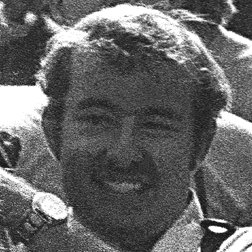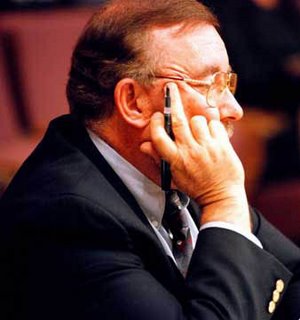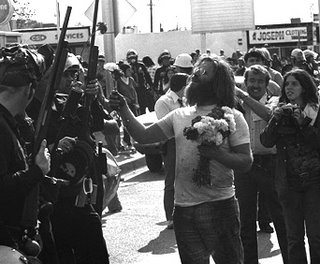 This is the face of a very young Jim Baca. It's the spring of 1972 and he was working for KOAT TV-7 as a news photographer/reporter in Albuquerque.
This is the face of a very young Jim Baca. It's the spring of 1972 and he was working for KOAT TV-7 as a news photographer/reporter in Albuquerque. I have been acquainted with Baca off and on over the years and have watched his public activities with some interest.
I would like to introduce him and recommend his blog for your consideration; "Only in New Mexico" at http://onlyinnewmexico.blogspot.com/.
He is a real political animal. Don’t take that as a bad thing as he is committed to doing good work. By all accounts he has been pretty successful in accomplishing his goals politically, both in being elected and when he served in appointed positions.
Baca moved from television, where he was a weekend anchor and went on to do public relations for politicians. He served New Mexico Governor Bruce King, as News Secretary in 1974. He then worked for the New Mexico State Legislature before becoming Public Information Officer and Policy Assistant for Albuquerque Mayor Harry Kinney, 1974-75.
He served on the Albuquerque International Balloon Fiesta Inc. Board, 1975-77.
In 1978, he was involved in Bruce King’s second campaign for governor of New Mexico and King appointed him as New Mexico State Liquor Director, 1980-82. Baca revamped the State Liquor Division and shepherded major changes to the New Mexico Liquor Control Act through the State Legislature.
In 1982, Baca was elected to a four-year term as New Mexico Land Commissioner.
He decided to run for mayor of Albuquerque in 1985.
In the initial election Baca finished first in a nine-candidate field. He did not obtain the necessary percentage to avoid a run-off election with City Councillor Ken Schultrz.
Baca and Schultz were invited by the police union to give their campaign pitch. It was no secret that Schultz was favored by the union’s leadership. Baca sensed that the union was going to endorse Schultz and told the gathered officers he was not seeking their endorsement. Baca was very critical of officers' use of force and to beware that if they endorsed the wrong candidate, it would hurt them if he, Baca, were elected. The officers took his statements as a threat and made a negative endorsement of Baca. Schultz advertised the action as a positive endorsement and went on to win the run-off election by about a 400-vote margin.
Baca later approached me on the street when I was president of the police union and told me that then Chief of Police Sammy Baca, no relation, had, during his failed mayoral campaign, offered him a potentially damaging Intelligence Unit file on Schultz.
The Albuquerque Journal uncovered the story and Mayor Schultz ordered an inquiry of the Intelligence Unit’s investigations by the Independent Review Officer, former New Mexico Supreme Court Chief Justice Bill Reardon, who ultimately uncovered improper practices.
Baca was General Manager of the Middle Rio Grande Conservancy District, 1988-89 and attempted to make major changes to an entrenched, almost feudal, water control system and was forced out of the position.
In 1991, Baca was elected to a second term as New Mexico State Land Commissioner, but did not serve out his four years because in 1993, he was appointed Director of the Federal Department of Interior's Bureau of Land Management in President Clinton’s administration. He upset oil and gas interests in the Western states that wanted easy access to BLM lands for drilling.
In 1994, Baca campaigned for the Democratic Party's gubernatorial nomination and lost in the primary.
When Baca ran for mayor in 1997, I recommended the union board endorse him, however, they endorsed former Governor David Cargo.
Baca was elected Albuquerque mayor for a four-year term.
Before taking office, he called me asking my opinion if he could remove then Chief of Police Joe Polisar, who had been the Intelligence Unit supervisor during the aforementioned investigation. I told him that because the chief worked at the mayor’s pleasure, of course he could remove him. Baca sent a henchman to unceremoniously fire Polisar.
Baca asked me whom he should appoint and I told him he should conduct a global search. He was concerned that officers in the department would be upset for not selecting someone from within. I told him, if, after a nationwide search, he had not found a suitable candidate, he could always return to the department.
He promised the union they would be involved in the selection process of a new chief, but did not appoint anyone to his selection committee. I asked for the list of the 73 applicants under the Inspection of Public Records Act, but Baca, through his underlings, refused. I filed for a temporary injunction that was denied by the District Court. I decided not to pursue the issue when Baca appointed the union president to the selection committee for the final choice. Baca chose the chief of police from Toledo, Ohio, Gerald Galvin.
After taking office, Baca appointed a police officer, who supported him during his campaign, to manage the city’s golf courses. There was a brouhaha over his lack of management qualifications. When the press determined that the officer’s application had been altered to improve his resume, Baca relented and released the officer.
Baca accused me of having exposed the officer’s actual qualifications. I had nothing to do with trashing the officer. I believed Baca could appoint anyone he wished at that level without regard for the person’s qualification. I was later told a senior administrator rewrote and enhanced the resume to create the appearance of qualifications without the officer's knowledge.
During his term, Baca took a strong position against employees during negotiations. This is nothing unexpected or unusual for mayors, but Baca took umbrage at the public comments made in an effort to sway popular opinion.
 In all his experience, Baca had not dealt with unions and was unaccustomed to having employees treat him as an equal at the negotiations’ table.
In all his experience, Baca had not dealt with unions and was unaccustomed to having employees treat him as an equal at the negotiations’ table.Baca was very critical of officers' use of force and routinely over-reacted to events and seemed quick and harsh in his judgments towards officers. He, along with the City Council, instituted a process to create a citizen’s police oversight commission.
I monitored the process and attempted to influence the council to avoid compromising due process issues for accused officers. The council passed an ordinance and a commission was appointed. They attempted to hire an independent review officer using a closed process. I sued the POC for violating the Open Meetings Act in District Court and won.
The POC continued to violate the Open Meetings Act and when I called them on it at a public meeting, I was ordered by a Deputy Chief to sit down. I was later ordered to Internal Affairs where an investigator physically assaulted my lawyer. When I interceded to calm things down, I also was attacked. All this was captured by my video camera.
Chief Galvin fired me and I was criminally charged with simple battery on the investigator. The department could not sustain any departmental violations. I won an unfair labor practice complaint. The City prosecuted the criminal charge and at the end of their presentation the Court dismissed the charge citing the incident as the worst interrogation the judge had ever seen.
The City offered to mediate a settlement the day before a final personnel hearing would return me to work. I settled, with the City reinstating me, making me whole and paying major damages. I chose to retire, as I previously planned to do a month after the original incident.
Baca stood by without interceding.
In 2001, Baca lost reelection to former and current Mayor Martin Chávez.
In 2004, Baca was appointed by newly elected Governor Bill Richardson to be the New Mexico Natural Resource Trustee.
He resigned and is now a Democratic primary candidate seeking a third term as New Mexico State Land Commissioner.
When he hasn’t served in public positions, he has his own public affairs consulting practice and is Vice President of Business Development for ROAD 9, INC., a fiber-to-the-home network company.
He has served as board member of the National Wilderness Society, the Southern Utah Wilderness Alliance, the New Mexico Wilderness Alliance and the Wyss Foundation.
So, What’s wrong with this picture?
 Nothing much, unless you want to read into it that Baca found the image of anti-war protestor’s placing carnations in the barrels of officers' shotguns humorous or demeaning.
Nothing much, unless you want to read into it that Baca found the image of anti-war protestor’s placing carnations in the barrels of officers' shotguns humorous or demeaning. He and I do not see eye to eye on a number of issues; in particular, unionism and his views on police officers' use of force. We are also not of the same political persuasion. I however, believe that his conservationist role matches nicely with my own philosophies on the environment and the protection of natural resources.
I believe that Jim Baca has been most outstanding in his prior terms as Land Commissioner. I also like him as a person.
No comments:
Post a Comment